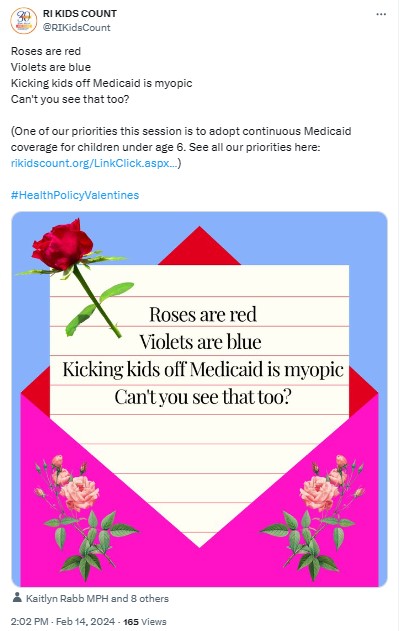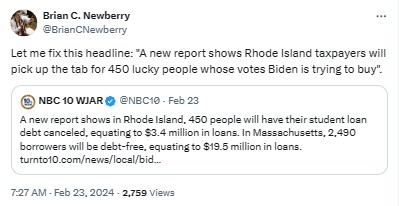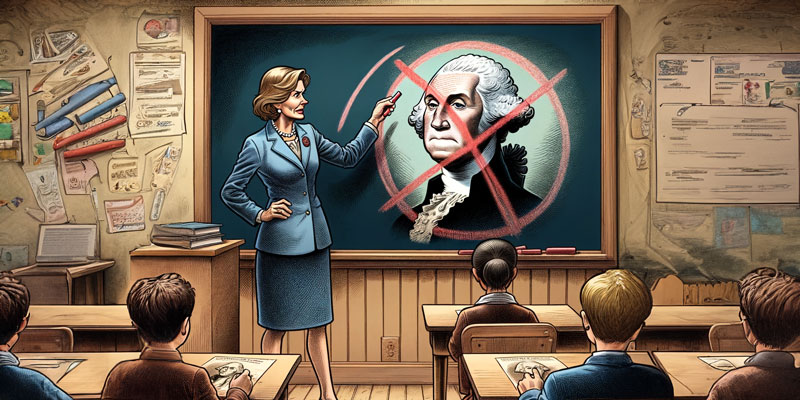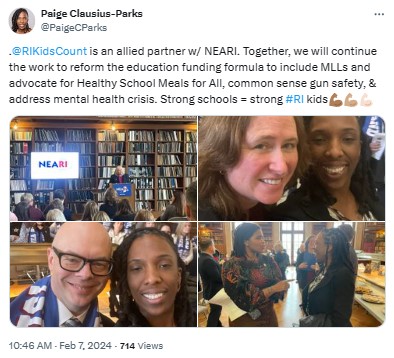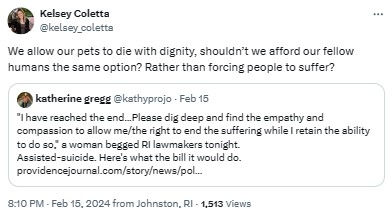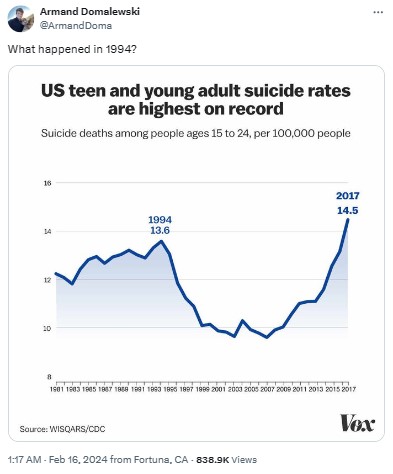It seemed to be a mini-fad, this year, for progressives to post fake Valentines on social media that weren’t about love, but about their political positions. This one, from RI Kids Count captures the distasteful feel with particular gusto:
The tone is hard to miss, with its insinuation of superiority and assumption of bad-intent and/or blindness. The post even uses a word from the classic vocabulary of pretention, “myopic.”
This is a small thing, to be sure, but something about it really captures the flavor of life under a progressive regime.
[Open full post]Brian’s got this right, but it’s not the entire story:
$3.4 million to 450 people is $7,556 each. That’s not life-changing money; it’s purely a political handout at others’ expense. Wait until the kids discover how limited this handout is, by the way. Most of them are actually struggling with their private loans, which tend to be much larger and that are carrying interest increases under Biden that more than wipe away the benefit of the subsidized-loan buy off.
[Open full post]For those willing to step outside the boundaries of “just the way we do things,” the justification for mandatory schooling backstopped by taxpayer-funded government schools is an interesting question. I’d pick up the rope and pull for the “yes, justified” side. A country founded on freedom and individual achievement and held together by abstract agreement on a limited number of principles and values must inculcate those principles and values in children and owes it to them to provide a foundation for their opportunity to achieve.
However, watching Politico reporter Heidi Przybyla restate one of America’s founding principles as if it is an extremist belief she’s discovered among a particular modern political faction — as the others on the panel “uh-huh” along — is pretty good evidence that the project has failed:
So I wanted to pull the more extended clip of this because surely the reporter clarified. But actually, it gets worse. She confuses mainline and mainstream evangelicalism (the former are liberal denominations). And says these Christians want to apply natural law to marriage,… https://t.co/GTrUIHTKYT pic.twitter.com/Svl5kewNqi
— Erick Erickson (@EWErickson) February 23, 2024
Other news, however, suggests the situation is somewhat worse than schools’ merely failing to pass along the values of the United States of America. Rather, progressives are using them to implant new, radical, and partisan values in children. Rhode Island teacher Ramona Bessinger describes her experience with government-sponsored training on “disinformation” and “violent extremism,” on Legal Insurrection:
An example of this can be seen in three lesson plans presented by Courageous RI. In the first lesson, facilitators talked about taking literature and changing the plot, themes and characters to fit a “less extremist viewpoint”. There were several examples provided by the Courageous group, but the three lessons that stand out I call “Feminist Versions of Little Red Riding Hood” (English Language Arts) “Captain America is a Violent Extremist” (Art) and “Insurrectionists and January 6th” (Civics)
Teachers were told to have students discuss the harmful potentially dangerous themes expressed in classic literature and iconic characters. “Little Red Riding Hood” was seen as anti-feminist, and “harmful” to women, while “Captain America” was seen as a symbol of violent extremism. Social Studies looked to January 6th to tell and retell the story how dangerous conservatives are. In fact, one facilitator wrote a book dedicated to discussing the polarization of MAGA republicans in Middle School classrooms. Presumably, classic literature, history, and art were all a threat to homeland security.
Rhode Island schools have struggled for decades to improve students’ proficiency on academic subjects, and the evidence is beginning to suggest one reason: that isn’t their focus. Upholding American values is apparently also not their priority.
As graduating class after graduating class is robbed of the promise of education, those of us who can remember what that promise used to be must become more vocal. Schools that are neither instilling quintessentially American principles nor preparing students to thrive don’t deserve our continued investment.
Featured image by Justin Katz using Dall-E 3 and Photoshop AI.
[Open full post]This is all about ideology and politics, not about truly educating Rhode Island students:
Most Rhode Islanders don’t have any idea who these people are, and many of those who do want to avoid the danger and cognitive dissonance of believing they have ulterior motives. Nonetheless, as long as they have prominent roles in public education in our state, students will suffer.
[Open full post]That’s the only explanation for this sort of thing:
The activist-lawyers at the ACLU would have us believe that they are so blinkered by ideology that they can’t see a distinction between a children’s hospital removing unhealthy breast tissue to stop cancer and removing healthy breasts for cosmetic reasons under the assertion that it will help relieve a mental illness.
Pay attention, by the way, to the “full stop” language, which I’ve seen with increasing frequency from trans activists. We should be concerned that this petulant insistence that disagreeing is simply not acceptable has contributed to the increase in violent attacks from transgenders.
[Open full post]On WNRI 1380 AM/95.1 FM, John DePetro and Justin Katz discuss:
- Political establishment deteriorating with the Washington Bridge
- Safety falling through the gaps of immigration euphemism
- Media punts on journalism when it comes to people they hate
- Tidewater beneficiaries
- “Quiet campaigns”
Featured image by Justin Katz using Dall-E 3 and Photoshop AI.
[Open full post]I mean, I know from experience it can still be sad and traumatic, but at the end of the day, few people exhaust the medical possibilities before concluding the cost is too high. That’s why this tweet is an example of the way in which political arguments can brush aside the most significant distinctions:
Kelsey calls such statements “stupid,” but it’s simply undeniable that euthanasia for human beings with the same standards as for pets would be a downgrade for humanity.
[Open full post]Armand Domalewski asks an important question, when he observes a quick decrease in teen and young adult suicide after 1994, which held until about 2008 and in 2017 exceeded its previous high:
The more important question, though, is what has been happening since 2007/2008.
Having graduated high school in 1993, I’d speculate that the drop in the ’90s had to do, most profoundly, with the lightening of the existential dread of nuclear war after the Berlin Wall fell in 1989 combined with young adults’ trimming their Baby Boomer parents’ greater social excesses and gaining a general optimism for the future based on economic growth with the rise of information technology.
Corresponding with the elevation of Obama, efforts to revive existential dread based on the environment and to erase progress toward racial harmony, not to mention attacks on the economic freedom, reversed those trends.
[Open full post]Entirely apart from ideological battles, the push at the ABC6 news operation in Rhode Island is a bad sign for the station:
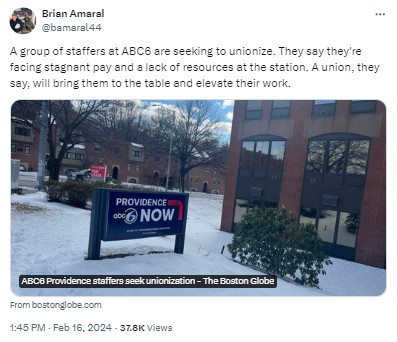 Over a quarter century of living in Rhode Island, I’ve seen no movement from ABC6 toward a greater competitive position against WJAR (10) and WPRI (12). The perennial third-place laggard from a struggling industry in a deteriorating small-market state needs flexibility and an entrepreneurial spirit across the organization, not the what’s-in-it-for-me sclerosis of a workplace model more suitable to a factory, where workers are interchangeable.
Over a quarter century of living in Rhode Island, I’ve seen no movement from ABC6 toward a greater competitive position against WJAR (10) and WPRI (12). The perennial third-place laggard from a struggling industry in a deteriorating small-market state needs flexibility and an entrepreneurial spirit across the organization, not the what’s-in-it-for-me sclerosis of a workplace model more suitable to a factory, where workers are interchangeable.
Of course, in this state, nobody will question the move, and it will likely be the final, fatal albatross for ABC6.
[Open full post]The Rhode Island Center for Freedom and Prosperity has called for the removal of Rhode Island Education Commissioner Angelica Infante-Green. They make their case here.
I echo their call.
During her tenure, Education Commissioner Angelica Infante-Green has failed to implement successful education reforms. She has instead prioritized questionable, experimental, non-education initiatives in Rhode Island’s K-12 schools
She introduced the neo-racism of critical race theory (while she and RIDE denied this was happening) which falsely teaches innocent, strong children of color that they are impuissant victims and innocent white children that they are oppressors and victimizers.
During the COVID-19 pandemic, she supported mask mandates on students despite extensive data and evidence that they were unnecessary for the public health and actually harmful to students and their learning, especially in the area of speech.
It is important to note that Ms. Infante-Green’s execution as Education Commissioner has been in sharp contrast to her original, stated goals upon taking the position in 2019.
This is about solutions, about moving forward and providing the best education possible. …
“Students in other states perform well,” she told reporters. “But our goal is to out-perform those students.
It would be interesting to know how much of RIDE’s turn away from education has been at the direction of Governor Dan McKee or if it was largely at Ms. Infante-Green’s initiative. Either way, she has failed to provide “the best education possible”. And the results are clear in Rhode Island’s student (non)achievement.
The focus of RIDE needs to return to education and advancing the best interests of children. It is clear that this cannot happen under the current leadership. For the sake of our children and K-12 education achievement in Rhode Island, Ms. Infante-Green needs to step down or be removed as Education Commissioner as the first step of RIDE returning to its core, critical mission of education.
If the concerns that the Center and/or I have outlined strike a chord with you, please consider adding your name to this call.
Featured Image by Element5 Digital via Unsplash
[Open full post]


